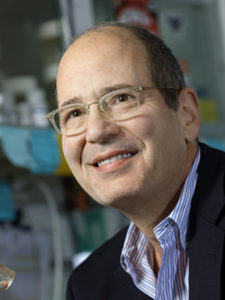
Fibrosis may contribute to as much as 40 percent of all human deaths through its activity in malignancies, infection, autoimmune disease, and other health conditions.
“We had a strong conviction that if we could come up with fundamental processes that are required for fibrosis, we could have a major impact on public health by coming up with universal treatment strategies,” said Harry Dietz, MD, Professor of Pediatrics, Genetics and Medicine at the Johns Hopkins University School of Medicine Institute of Genetic Medicine and investigator with the Howard Hughes Medical Institute.
“We have come up with a class of molecules that appear to be required for a very fundamental process in fibrosis, myofibroblast differentiation. We have developed convincing evidence that blocking this family of enzymes is effective and well-tolerated, both in mouse models and in people.”
Dr. Dietz will discuss the strategies his lab used to explore and to characterize the mechanisms of fibrosis that underlie diseases in the liver, lung, heart, and other organs during an ACR symposium New Mechanisms & Vulnerabilities in Fibrosis on Sunday from 9:00 – 10:00 am Sunday in Room W185a. Using systemic scleroderma as an example, he will highlight some of the new therapies on the horizon.
He will present some of the latest findings on epigenetic regulation in scleroderma and potential therapies. A company formed to exploit his lab’s findings has developed a drug candidate that shows significant efficacy in preclinical models.
“Everything that I am going to talk about represents fundamentally new knowledge in the field that has not been published,” Dr. Dietz said. “A drug has been developed that shows dramatic evidence of efficacy in preclinical models. Everything I am going to talk about has the potential to inform the development of new treatments for patients. I want to encourage and provoke others to use a similar process to tackle the devastating disease that is fibrosis.”
Of all the fibrotic diseases, systemic sclerosis is among the most devastating and most mysterious. This common form of scleroderma generally strikes young, previously health individuals with a sudden onset of body-wide inflammation followed by an unrelenting predisposition to scar, first the skin and later the internal organs, leading to death.
There are no broadly useful treatments for systemic scleroderma, Dr. Dietz said, in large part because the disease has no recognizable genetic signature. Reports of recurrence within families are extremely rare. And because none of the genes that are active in systemic scleroderma have been identified, there are no useful animal models of the disease.
It is clear that some sort of genetic signaling or memory process is involved, he said.
When skin from systemic scleroderma patients is cultured, the new skin maintains extraordinarily elevated production of proteins associated with fibrosis even though the culture has been removed from any sources of inflammation that might be present in the patient. These cultures that are predisposed to fibrosis show no classic genetic changes.
“What we have explored and proven is that there is an epigenetic mechanism of memory that is driving this disease process in systemic sclerosis fibroblasts,” Dr. Dietz said. “And we have identified specific molecules that, when inhibited, allow these cells to revert to normal performance. If you take skin from someone with systemic sclerosis and put it into organ culture, these manipulations we have identified have the capacity to not only prevent more deposition of collagen into the tissue, but to actually clear existing collagen.”
Dr. Dietz noted that his lab has not identified a specific cure for systemic sclerosis, but it has identified a clear fibrotic pathway that can be altered using specific genetic as well as pharmacologic techniques.
“Our findings suggest that modulation of these recently identified epigenetic events has the capacity to reverse fibrosis in systemic sclerosis,” he said. “There is still a lot of work to be done, but it is an exciting foundation that has many implications. I hope I can stimulate thinking along similar lines by other investigators.”


